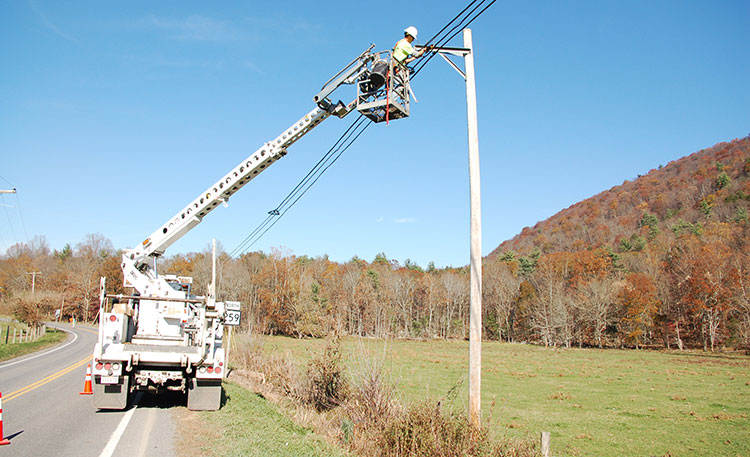Hardy Telecommunications recently celebrated its 2,000th OneNet customer, marking a milestone in the development of the only fiber-to-the-home network in Hardy County.
“To hit 2,000 customers is a big moment for us,” said Derek Barr, Hardy’s director of customer service and sales, marketing and human resources. “When we first applied for federal broadband stimulus funds, our initial goal was to sign up a little more than 2,000 customers. We are very close to hitting our original project mark.”

The company received a grant/loan from the U.S. Department of Agriculture Rural Utilities Service’s broadband program to construct OneNet, which provides fiber-optic cable connections directly to residents’ homes in Hardy County. Fiber-optics allows Hardy to offer the fastest internet speeds in the county and also marked the cooperative’s first foray into providing television.
Even though the federal portion of the OneNet project ended in 2015, Hardy has continued to construct the fiber network throughout the county.
“The difference between now and when we were under the federal project is that now we no longer have access to those federal funds,” Derek said. “We have to pay 100 percent of the construction and installation expenses. That limits how quickly we can build, because we are repaying almost $10 million in loan money to the federal government, plus we have to maintain enough capital to cover expenses. When we have sufficient cash flow, we put that toward construction and installation of OneNet.”
The 2,000-customer plateau is particularly meaningful to Hardy Telecommunications because various concerns caused it to slow its original plan to build OneNet.
“We had to do so much to satisfy environmental regulations, not because of any problems discovered, but simply because of the testing we were ordered to perform, even in areas where we didn’t anticipate it,” Derek said. “That caused us to get a late start. When the federal project deadline came, we were out of time, even though we hadn’t spent all of our allotted money. The result was that, although we wanted to pass about 8,000 homes, we only passed about 4,800 during the federal project.”
Since then, however, Hardy has extended OneNet to approximately 400 more homes and continues to build in several areas.
“It’s a slower process, but the expansion is continuing,” he said. “That’s why reaching 2,000 customers means so much, because we’ve accomplished that feat even though we haven’t gotten fiber to as many homes as we want. We still have a lot of work to do.”
Derek said applications for OneNet service have been steady every month since the project began.
Hardy is particularly proud that its fiber network allows it to offer 1 Gigabyte connectivity (a speed popularized by companies like Google) among all county schools and to the state network. Although OneNet features 25 Mbps download as a standard offering, Hardy can bring 1 Gigabyte speed to a fiber customer if needed.
“There is no reason that rural residents shouldn’t have access to the same internet speeds as those in urban areas. Unfortunately, many of the federal broadband policies seem to be designed to favor urban areas, not taking into account the expense involved in serving an area like Hardy County, where there are fewer residents and the terrain is so mountainous and rocky. We want Hardy County residents to have the same online opportunities as city residents,” he said.
The most popular OneNet package is a triple-play offering of television, internet, and telephone, but Hardy also offers double-play packages with internet and phone or television and phone.
“You can get the internet speeds possible with OneNet without also getting television,” Derek said. “Or you can get television without broadband.
“I have to say, though, that the broadband is truly what makes OneNet stand out. You can’t beat what a fiber-to-the-home network does for internet speeds.”
